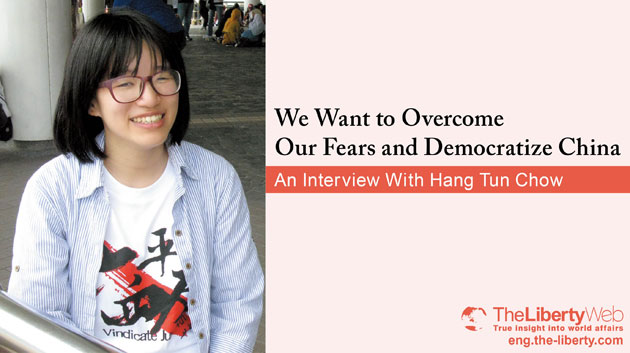We Want to Overcome Our Fears and Democratize China
An Interview With Hang Tun Chow
Hong Kong’s future depends on whether it can become a democracy. We interviewed Hang Tun Chow, a Hong Kong activist who has been part of the Hong Kong Alliance since she graduated from University. We asked her about her activities and the impending dangers from China.
Ms. Hang Tung Chow graduated from the University of Cambridge, Manchester Metropolitan University, and University of Hong Kong. Now she is volunteering for the Hong Kong Alliance in Support of Patriotic Democratic Movements in China as a Vice President, Amnesty International Hong Kong, and China Human Rights Lawyers Concern Group.
Tiananmen Square And The Birth Of Activism
Interviewer: Why did you decide become an activist?
Chow: The Hong Kong Alliance was established after the 1989 Tiananmen Massacre, and this year is the organization’s 27th anniversary. While I was still in primary school, my parents took me to the mourning site with candles for the Tiananmen victims. I then went to England for university and realized that on June 4th no one mentioned that it was the anniversary of the Tiananmen Massacre. I thought, “what if I create events and discussions myself?” That was how I began this movement.
I: The number of victims is reported to have been around 300 people.
C: That is a huge underestimation. I think of the Tiananmen Massacre as genocide by the Communist Party of China, where they used their military power to pressure the civilians. The civilians of course had no method to counter them.
Democracy and Human Rights
I: Your organization works to try and awaken the people of Mainland China to democracy. What kind of activities do you encourage?
C: We continue to send information to tourists visiting from the Mainland that they wouldn’t be able to find in their area because of censorship. We also message people with an interest in democracy and democratization on Facebook.
I: I heard that you support various human rights activists.
C: Hong Kong is a place that connects China to the rest of the world. We want to be able to pressure the Chinese government and warn the international community through acting as the voice for activists in China. I think Hong Kong has a very important role as the Connection Centre.
I: How to do get information from human rights activists?
C: Although this is not made public, many Hong Kong NGOs are acting in China. We gain information through their underground network.
The Long Arm of China
I: Have you experienced pressure from China?
C: Yes. There were many cases where our members and supporters were denied entry into China. This is a major turn off for young people who could potentially join our movement. Travel between Hong Kong and China is imperative in business, so companies don’t employ these activists. It hinders the future of their career. Rather than focusing on arresting people, China extends its influences in the world of business. It’s been nearly 20 years since HK become a special administrative region of China, and I think that China found that the people of Hong Kong have not been favorable. So I think the Chinese government is slightly anxious about the Hong Kong people. This is why they have had to display their power through incidents such as the Causeway Books abduction.
I: Do you think that Xi Jinping is trying to increase his power?
C: Yes. He recently went around the state media to remind them that they have to be loyal to the government. There used to be media companies like the Southern Media Group that were very open, but now the regulations have become tighter and many people are quitting. The same thing is happening in Hong Kong. Independent media companies that are not pro-China have decreased. For instance, Hong Kong TV had their license taken away, and now they can only operate online. This has made it very difficult for them to keep funding their projects. China is trying to prevent new media companies from emerging through establishing strong censorship laws.
A Second Cultural Revolution?
I: Some people criticize the government for wanting a second Cultural Revolution.
C: Although they are not that big yet, there is indeed great potential for it. Xi Jinping probably has a desire to become deified and worshipped like Mao Zedong.
The Future of Hong Kong
I: What kind of future awaits Hong Kong do you think?
C: Hong Kong’s future is closely related to how China’s future turns out. There will be many cases in the future, where the Chinese government will not budge an inch regardless of how much we struggle, much like what happened in the Umbrella Movement. The key is for the Hong Kong people to support the democratic movement in China, and make changes from inside the Mainland. We can’t change Hong Kong from just focusing on Hong Kong. We want to influence China through our values, so that it can become a democracy where people can openly speak their opinions.
I: How will other countries play a role in preserving freedom in Hong Kong?
C: We have been continuously speaking out to the world through international media, such as The Liberty, and politicians from other countries. We, however, have to watch out for isolation. We must stay connected to the people from the Mainland and with the rest of the world. Otherwise we cannot survive the attacks from the autocracy of the Communist Party.
I: How will you continue to aim for freedom in Hong Kong?
C: We will continue to do what we think is the right thing to do. I want to cast away my fears when we do this; because fear prevents us from doing what we think is valuable. As I have said before, fear has crept into the whole of society. Many people have fears that are stopping them from acting.



















